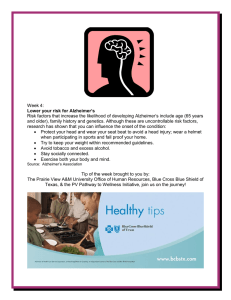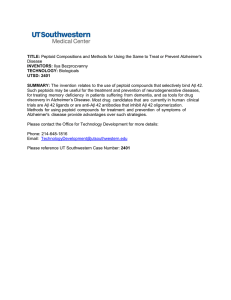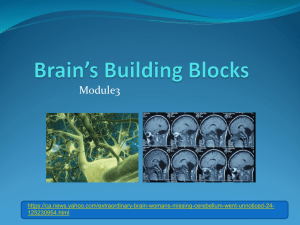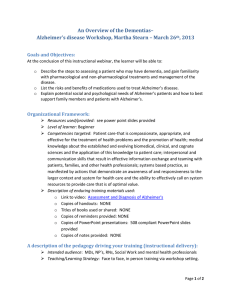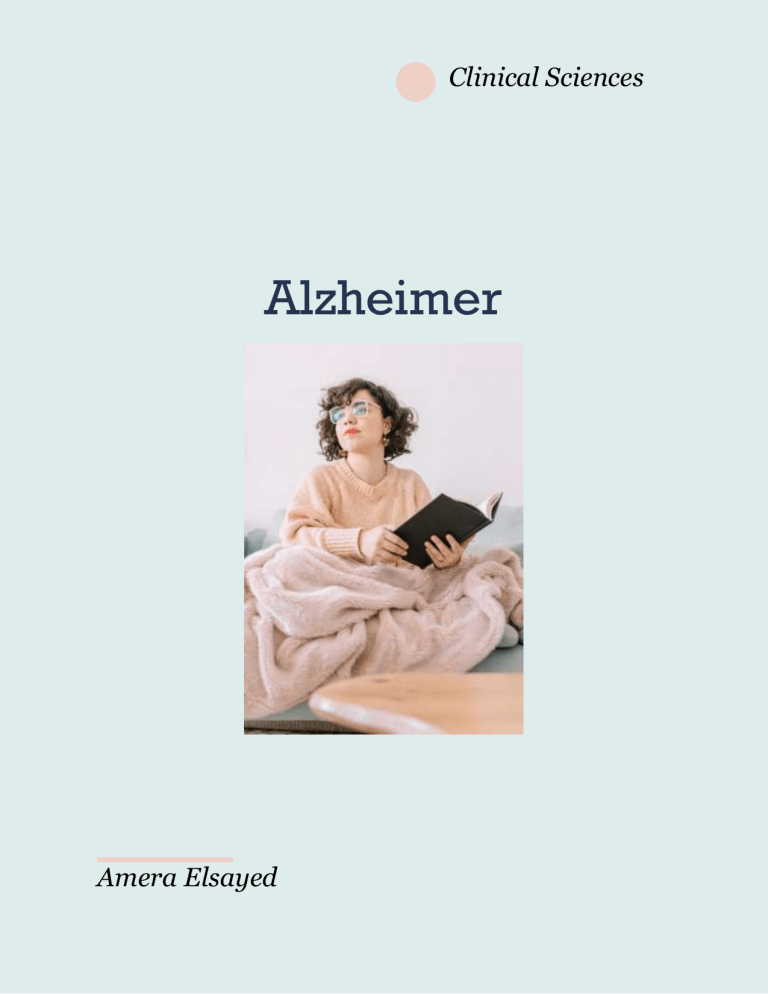
Clinical Sciences Alzheimer Amera Elsayed Alzheimer People with Alzheimer’s have trouble doing everyday things like driving a car, cooking a meal, or paying bills. They may ask the same questions over and over, get lost easily, lose things or put them in odd places, and find even simple things confusing. As the disease progresses, some people become worried, angry, or violent. Symptoms: Diagnosis: In the early stages, the main symptom of Alzheimer's disease is memory lapses. A specialist will usually assess your mental abilities, such as memory or thinking, using tests known as cognitive assessments. Early symptoms For example, someone with early Alzheimer's disease may: forget about recent conversations or events misplace items forget the names of places and objects have trouble thinking of the right word ask questions repetitively show poor judgement or find it harder to make decisions Mental ability tests 1-CT scan – several X-rays of your brain are taken at slightly different angles and a computer puts the images together 2-MRI scan – a strong magnetic field and radio waves are used to produce detailed images of your brain PAGE 2 become less flexible and more hesitant to try new things There are often signs of mood changes, such as increasing anxiety or agitation, or periods of confusion. Causes: Middle-stage symptoms Researchers trying to understand the cause of Alzheimer's disease are focused on the role of two proteins: As Alzheimer's disease develops, memory problems will get worse. Someone with the condition may find it increasingly difficult to remember the names of people they know and may struggle to recognize their family and friends. Other symptoms may also develop, such as: increasing confusion and disorientation – for example, getting lost, or wandering and not knowing what time of day it is obsessive, repetitive or impulsive behavior delusions (believing things that are untrue) or feeling paranoid and suspicious about carers or family members problems with speech or language (aphasia) disturbed sleep changes in mood, difficulty performing spatial tasks, such as judging distances Alzheimer's disease is thought to be caused by the abnormal build-up of proteins in and around brain cells. Plaques. Beta-amyloid is a fragment of a larger protein. When these fragments cluster together, they appear to have a toxic effect on neurons and to disrupt cell-to-cell communication. These clusters form larger deposits called amyloid plaques, which also include other cellular debris. Tangles. Tau proteins play a part in a neuron's internal support and transport system to carry nutrients and other essential materials. In Alzheimer's disease, tau proteins change shape and organize themselves into structures called neurofibrillary tangles. The tangles disrupt the transport system and are toxic to cells. As brain cells become affected, there's also a decrease in chemical messengers (called neurotransmitters) involved in sending messages, or signals, between brain cells. Risk Factors: seeing or hearing things that other people do not (hallucinations) . Later symptoms In the later stages of Alzheimer's disease, the symptoms become increasingly severe and can be distressing for the person with the condition, as well as their carers, friends and family. Age Family History and genetics Down syndrome Sex Head trauma Life style and heart health Complication: Bladder and bowel problem Depression Infections Malnutrition and dehydration PAGE 3 Hallucinations and delusions may come and go over the course of the illness, but can get worse as the condition progresses. Falls PAGE 4 Lorem Ipsum is simply dummy text of the printing and typesetting industry. PAGE 5
